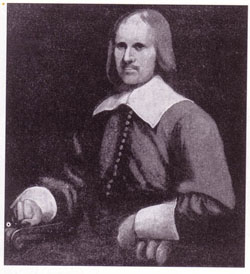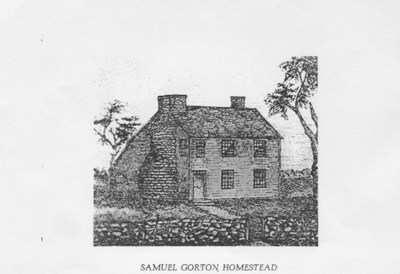Bios

Samuell Gorton born 1592 Gorton, Manchester, England, died Dec. 10, 1677, Warwick, Rhode Island
July 6, 2005
To descendents of Samuel Gorton I of Rhode Island:
Since it is Independence day I am writing this to give you some information about your ancestors on Frances Lenore Myers' side (Constance Gates' mother). Frances Myers' mother's name was Mary Augusta Gorton and she descended 7 generations back from Samuel Gorton (William7, Benjamin6, John5, Benjamin4, Samuel3, Samuel2, Samuel1), the original settler who founded Warwick, Rhode Island.
It is a shock to read about Samuel Gorton's political views since he apparently was the original thinker who influenced much of our country's philosophy. He believed in separation of church and state and believed an individual could have direct contact with God and did not need priests.He was against slavery and was for equality of women (this was in 1642!)
He was so radical that they kicked him out of the original colony in Boston (It's a long story but fascinating to read. Read online: The Life and Times of Samuel Gorton by Adelos Gorton, 1907. Frances Lenore Myers is on p 517!) ) and he was banished to Roger Williams' more tolerant settlement in Rhode Island. Samuell Gorton founded his own religious settlement in Warwick (pronounced "War-ick"), R.I., a coastal area about 25 miles north of Newport, RI. His followers became known as "Gortonites", who later became Christian Trancendentalists and then Unitarians-, the Unitarian Church (now Universalist Unitarian). That's pretty shocking to think that our ancestor was a main thinker behind our democratic government and created his own religion.
But then I find out that since there were only a few original families in the settlement, they all intermarried, so some of our Gorton blood has different names. Mary Gorton, granddaughter of the original Samuel Gorton, marries Samuel Greene and they buy her Grandad Samuel's original house. So, then the "Greenes" lived in the Gorton house.
One of their sons, William Greene, becomes Govenor of RI, and his son, William Greene Jr., also a govenor, active in the revolution, marries a woman who is friends with Benjamin Franklin. Gov. William Greene Jr.'s cousin, Nathanael Greene (the famous revolutionary hero who did a lot to win the war for the colonists), was George Washington's right-hand man during the revolution and many revolutionary meetings with George Washington and Benjamin Franklin were held in Samuel Gorton's original house in RI!
On his father's side, Nathanael Greene descended from James Greene, one of the original settlers who came with Samuell Gorton to Rhode Island but Nathanael Greene also descended directly from Samuell Gorton via Samuell's daughter, Susannah Gorton, who married a Barton and their daughter, Mary Barton, married a Greene. Nathanael was Mary (Barton) Greene's grandson.
That's enough, right? No, the actual cause of the outbreak of the revolutionary war, the first shot fired in the war, almost a year before the 1773 Boston Tea Party, (where colonist threw the tea overboard, after the Tea Act gave the East India Company a monopoly on the trade in tea and made it illegal for the colonies to buy non-British tea, forcing the colonies to pay the tea tax ) happened in Rhode Island, to cousins of the descendents of Mary Gorton and her husband, Samuel Greene!
It seems that Rufus Greene, who was captain of the "Fortune", a ship owned by Nathanael Green, (first cousin of Mary Gorton's great-grand-sons, Caleb and Christopher and later revolutionary hero), was stopped by a hated British Captain of the ship the Gaspee, who was trying to commandeer Rufus's ship and tax the rum he was carrying.. When Rufus refused, he was beaten, taken prisoner and the ship seized and sent to Boston ("to avoid riots in RI"). This incident caused the townspeople to rise up and destroy the Gaspee and the first shot was fired at the British Capt., who almost died but was saved by a RI doctor.
No one would admit to King George who had participated in the attack on the Gaspee, although a sizable reward was offered. The people of RI were in favor of the action! This spirit of unity soon spread to the other colonies with the formation of the Committees of Correspondence. These were groups formed of private citizens in Massachusetts, Rhode Island and New York who began, in 1763, to circulate information about opposition to British trade rules. These groups became particularly active following the Gaspee event. The First Continental Congress followed soon after and then the Declaration of Independence.
So your direct ancestor thought up much of what democracy is today. Although the Gortons married into other families and took on other names, the "Gortonites" in Rhode Island held similar political beliefs and became a cohesive society. When it came time, only 4 generations later, to stand up for political truth in 1772 and 1776, Samuel Gorton's views lived on, contributing who knows how much of our country's history! Can you believe it?
If you ever feel frustration when our country does not live up to its democratic ideals perhaps, even though it is 10 generations later, there may be still something of Samuel Gorton flowing in your veins!
Until the next chapter,
Take care,
Jan Markle
PS. Yes, Gorton Fishcakes Company was formed by one of the descendents of Samuel Gorton: Slade Gorton.

In the spring of 1677, Gorton returned to Warwick and, at the age of 85, he built this house at Warwick Cove. A later dwelling is now on the site and a boulder with a bronze tablet marks the place. -Warwick Rhode Island, warwickhistory.com
More info on Samuel Gorton and his complicated conflict with the boston colony leading to exile to RI and an article about the history of the Gorton surname, by Kay Gorton Thompson
Dramatic story on the burning of the Gaspee
More info on founding of Warwick, RI by Samuel Gorton
More on Mary Gorton and Samuel Greene and other Greenes in RI |